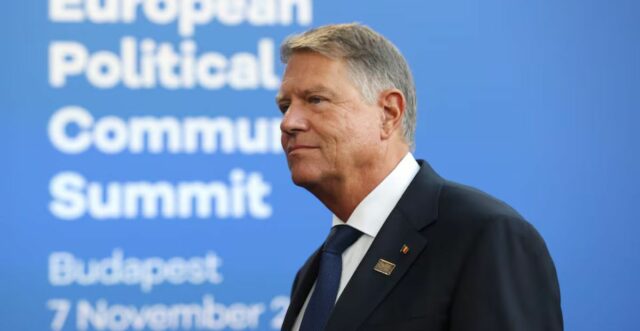Romania’s outgoing President Klaus Iohannis resigned on Monday to pre-empt an impeachment bid by opposition parties in Parliament, with voters highly polarized and the far-right gaining ground ahead of a repeat presidential election in May.
The European Union and NATO member state, which borders Ukraine, was plunged into institutional chaos last year when little-known far-right NATO critic Calin Georgescu won the first round of a presidential election.
After accusations of Russian interference, Romania’s top court voided the election and said Iohannis would stay on until his successor was elected in a May election re-run.
Iohannnis’ second and last term expired on December 21.
But three hard-right opposition parties, which control around 35% of parliament seats, filed a motion to impeach Iohannis.
The parties capitalized on popular anger directed at pro-European establishment parties mired in corruption allegations.
Moscow has denied accusations of interference.
With the motion up for a vote, and Iohannis deeply unpopular, analysts have said some lawmakers from mainstream pro-European parties could give the hard-right’s impeachment effort the required majority.
“The request will have consequences both domestically and abroad,” Iohannis told reporters.
“To spare Romania this pointless and negative crisis…I am resigning from the president’s office.”
Senate speaker Ilie Bolojan, head of the Liberal Party, a member of the ruling coalition, will take over as interim President with limited powers until the election.
Crin Antonescu, the presidential candidate currently backed by the three ruling coalition parties, said Iohannis’ resignation was “preferable to an impeachment process, which would have put a false theme on the public agenda.”
Support for Georgescu, who has said Ukraine is an artificial state, in opinion surveys has almost doubled since the cancelled ballot and he remains voters’ top choice although it is unclear whether he will be allowed to run again.
Last October the top court banned another far-right politician from running.
The three hard-right parties had used their campaign against Iohannis as a reason to stage protests and seize the political agenda.
An estimated 1,000 pro-Georgescu supporters staged a protest outside government headquarters on Monday, briefly clashing with riot police.
“Had he resigned in December, then it would have helped (ease tensions),” said Sergiu Miscoiu, a political science professor at Babes-Bolyai University.
“Now the hard right opposition is consolidated and can claim another victory.”
(With inputs from Reuters)
Delhi based journalist pickled in journalism. Have reported from nine world capitals and almost all parts of India. Over the last three decades, I have worked for India’s mainstream English dailies and contributed to All India Radio, Doordarshan and Women’s Feature Service. Also worked for international media including Japan’s leading newspaper, The Asahi Shimbun and done assignments for The Sunday Times, London, The Telegraph, The Guardian and the Canadian Broadcasting Corporation. Worked in the Embassy of France in New Delhi and can speak French to save my life. Write on Diplomacy, Politics and the social sector. Love Nature, heritage, Nature, animals and vintage cars. Enjoy cycling and playing badminton.





